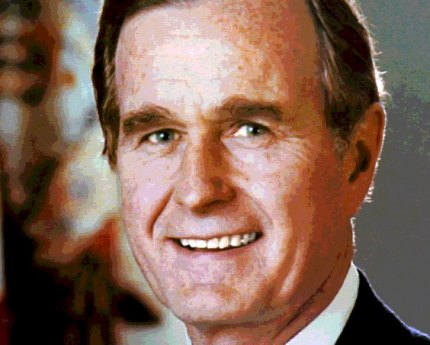
In particular, his civility stands out -- those old-school manners so hard to find in this scorched-earth era of partisan politics. Bush was close friends with political rival President Bill Clinton and highly regarded by President Barack Obama.
But he was also, notably, one of two American presidents whose son and namesake -- George W. Bush -- followed him into office. John Adams, the second president, led the other family team. His oldest son, John Quincy Adams, became the sixth president.
And then there's this: When George H.W. Bush died Friday, he was 94. So he lived longer than any other president. Ronald Reagan died at 93. (Jimmy Carter, who was also born in 1924 but is a few months younger than the elder Bush, may end up with this distinction.)
As president, Bush had many accomplishments during his four years in office. Here is the rundown:
The details: He was born June 12, 1924, in Milton, Massachusetts. His father, Prescott Bush (1895-1972), won election as U.S. senator from Connecticut in 1952. His mother, Dorothy Walker Bush (1901-1992), was the daughter of a banker.
Bush attended the Phillips Academy in Andover and, when he turned 18, enlisted in the armed forces. During World War II, he served as a pilot in the Navy. Afterward, he attended Yale and married Barbara Pierce. Their marriage endured for 73 years -- until her death in April. They had six children– George W., 72, the 43rd president, Robin (who died as a toddler), Jeb, 65, Neil, 63, Marvin, 62, and Dorothy, 59.
After moving to Texas, he began his career in the oil industry. But like his father, he had an interest in politics and became active in the Republican Party. He was elected U.S. representative from Texas in 1966 and served from 1967 to ’71. From there, he served as U.S. ambassador to the United Nations (1971-73), chairman of the Republican National Committee (1973-74), chief U.S. liaison to China (1974-75) and director of the CIA (1976-77). He was Ronald Reagan’s vice president from 1981 to '89 and was subsequently elected to the presidency, besting Democratic challenger Michael Dukakis.
At war: Any discussion of the elder Bush as president should include his handling of the first Gulf War. On Aug. 2, 1990, Iraq invaded Kuwait. Bush’s administration “promptly mounted Operation Desert Shield, consisting of a comprehensive diplomatic campaign and economic embargo against Iraq and a defensive military operation,” write William A. DeGregorio and Sandra Lee Stuart in The Complete Book of Presidents, (Barricade Books; 2013). Of 541,000 U.S. troops deployed, 148 were killed and 467 were wounded.
While the operation was hailed as a success, Iraq’s leader, Saddam Hussein, survived and would remain in power until his capture in 2003 by American troops during the Iraq War, when George W. Bush was in the White House.
The economy: Notably, Bush made a campaign promise to rebuff those who wished to raise taxes this way, “Read my lips: No new taxes.”
But he changed his position in June 1990, when he agreed to a bipartisan budget that increased taxes. That move cost him politically within his own party. When Bush lost his bid for re-election, pundits and politicians alike said it was because of the broken promise.
Later, however, Bush was credited with laying the foundation for budget surpluses that the country enjoyed with Clinton in office. Indeed, in 2014, Bush was given the John F. Kennedy Profile in Courage Award. (Read the story in The Boston Globe.)
Legislation of note: Bush approved the Americans with Disabilities Act, requiring businesses and places of public transportation to render facilities accessible to those with wheelchairs. In The Book of American Presidents, it is described as the most far-reaching anti-discrimination law since the Civil Rights Act of 1964.
He also approved the Clean Air Act of 1990, which bolstered anti-pollution standards and reduced toxic chemical emissions from factories.
Related:
Barbara Bush: Author, outspoken grandmother
Presidents, vice presidents and first ladies
Ranking the presidents, best to worst
History and the first ladies: How do they rate?
Like us on Facebook and tell us what you think.